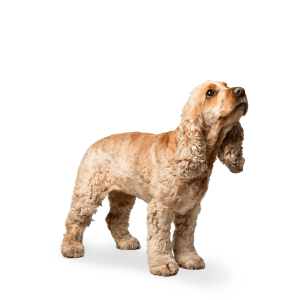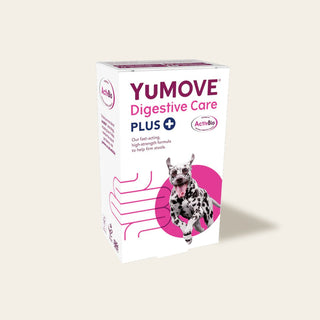

How to support your dog’s digestion
At YuMOVE, we know how much you love your furry family members. But it’s important to remember that they’re not mini-humans and are a completely separate species. And although their anatomy is similar to ours, it has its own distinctive features!
Your dog’s digestive system is a good example of this. Just as dogs need a different diet to us, their tummies also work differently and need different things than ours do. We know it’s not the most glamorous subject, but by becoming familiar with your dog’s digestive health and how it works, you’ll be better placed to spot the signs of sickness.
In this article, we run through the anatomy of your dog’s digestive system, how it functions and the signs of an upset tummy. We’ve also thrown in our top tips and digestive supplements for dogs to help keep their stomachs in the best possible shape. Let’s take a closer look…
Your dog’s digestive system: how it works

You might think of the digestive system as just your dog’s tummy, but it actually starts at the mouth, finishes at the other end, and encompasses everything in between:
A. The mouth
The digestive process starts as soon as your dog begins chewing on his or her food, and the enzymes in their saliva start to break it down.
B. The oesophagus
After your dog chomps down on their food, it’ll pass through the oesophagus. This tube contains lots of strong muscles which squeeze together to move food down into the stomach.
C. The stomach
Unsurprisingly, a lot of digestion happens in your dog’s stomach. Here, your dog’s food is
broken down just enough so it can enter the next stage of the digestive process. Your dog’s stomach contains acid and enzymes to break down and digest their food.
D. The small intestine
After your dog’s food is broken down in the stomach, the resulting mush is passed through to the small intestine. This is where your dog absorbs all the necessary nutrients they need. Everything they don’t need is left as waste, ready to be removed.
E. The large intestine
Anything that’s not used by your dog’s body goes straight through to the large intestine – a long, muscular tube. Here, it’s broken down a little bit more into stools, and water can be absorbed.
F. Rectum
This is the final stage of the digestive process, and it’s where your dog’s faeces are expelled from their body.

Fun facts about your dog’s digestive system
- It only takes around six to eight hours for your dog’s meal to pass, whereas it takes us two to five days!
- Dogs naturally want a varied diet. Unlike cats, who are obligate carnivores, dogs are omnivores. In the wild, dogs will eat a combination of meat, bones, fruit and veg.
- Your dog’s poo can tell you a lot about their health. That’s why it’s important for you to become familiar with your dog’s stools, so you can easily spot any changes (even if it isn’t the most pleasant thing to do!)
What does your dog’s poo tell you?
Changes in the colour, consistency or frequency of your dog’s poo is also a sign of unhealthy digestion. And although it can be a little gross, it’s so important to understand what your dog’s normal faeces look like. This way, you’re prepared to spot the signs of sickness.
Colour
Ideally, your dog’s stools should be brown. The specific shade varies for each individual dog, but the colour should stay fairly consistent with every poo. Abnormal colours to look out for
are red, or very dark black/brown.
Black, tarry poos are also a cause for concern. This is likely caused by digested blood from higher up the digestive tract – for example, your dog’s stomach or small intestine.
Consistency
The texture of your dog’s poo should be well-formed rather than sloppy. But it also shouldn’t be too dry or hard.
Frequency
Increased frequency in poos can be a sign of an irritated stomach or an intolerance. Less frequent poos can be a sign of overly firm or dry stools. Watch out for any straining, too.
What causes digestive issues in dogs?
Parasites
Many different parasites can affect the digestive tract. How much your dog is affected depends on the type of parasite, as well as your pet’s age and overall health. White spots in your dog’s faeces are a common sign.
Things your dog eats
Many digestive concerns are simply caused by overeating or poor-quality food. They can also occur if your dog chows down on something it shouldn’t, like a foreign object or plants toxic to dogs.
Prebiotics and probiotics
Just like us, dogs have a whole host of friendly microbes which exist in their gut. Most of the time, these bacteria live in perfect harmony, helping to digest food, fight off pathogens and boost the immune system. But this delicate balance of microbes can be offset by a variety of things, such as:
- Medications
- Infections and parasites
- Stress
- Diet
- Old age
This imbalance can cause many unpleasant things for your dog’s digestion – like flatulence, loose stools, cramps or even vomiting.
How YuMOVE Digestive Care can support your dog’s digestion

YuMOVE Digestive Care for Dogs is a unique mix of prebiotic and probiotic bacteria, specifically developed to support your pet’s digestive health and calm sensitive tummies. It works by keeping stools firm and increasing 'good' bacteria in the gut. YuMOVE Digestive Care PLUS is our high-strength version. It’s gentle but provides fast support for your dog’s digestion.
Every YuMOVE Digestive Care tablet contains 200 million helpful microorganisms, while every sachet of YuMOVE Digestive Care PLUS is packed with over 1 billion!
Other ways to improve your dog’s digestive health

Keep your dog happy and healthy with the following tips:
1. Get to know the warning signs
We all know the warning signs when it comes to our own digestion. And your dog’s warning signs are pretty similar.
2. Stick to a routine
A good mealtime routine is the best thing for your dog’s digestive health. Try to feed your canine companion at the same times every day, and make sure you’re giving them a complete and balanced diet.
3. Avoid sudden changes
Always introduce dietary changes slowly and avoid just taking one food away and replacing it with another.
4. Avoid human food
At YuMOVE, we know how tempting it is to give your dog an extra-special treat every now and then. But too many scraps can upset their digestive health.
5. Pay attention to what they eat
There are so many options when it comes to dog food. That’s why we created this handy guide on what to feed your dog.
6. Reduce stress
Stress and anxiety can manifest itself in many different ways. An upset tummy being one.
What’s more, a stressed dog might get upset and chew on or eat things it shouldn’t, causing more digestive dilemmas.
An all-natural calming supplement can help to keep your dog happy. YuMOVE Calming Care for Dogs has been specifically formulated for nervous pets. It’s available as a tasty tablet or a daily chew and works by easing anxiety and encouraging calm behaviour.
Want to find out more about your dog’s digestion? Check out our guide on the best food for your dog’s sensitive tummy.




